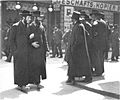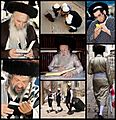Haredi Judaism facts for kids
Haredi (pronounced Ha-REH-dee) is a special and very traditional way of practicing Orthodox Judaism. It's sometimes called Ultra-Orthodox Judaism. Haredi Jews follow Jewish laws and traditions very closely, often trying to live as their ancestors did many years ago.
Haredi Judaism includes many different groups, each with its own customs. Some are part of Hasidic Judaism, which started in Eastern Europe. Others are Sephardic Haredim, whose families came from places like Spain, North Africa, or the Middle East. These groups can be different in their beliefs, how they live, and how they practice their religion. They often choose to live somewhat separately from the general culture around them.
Where do Haredi Jews Live?
Most Haredi Jews live in Israel, North America, and Western Europe. Their population is growing very quickly because families often have many children. Their numbers can double every 12 to 20 years.
It's hard to know exactly how many Haredi Jews there are in the world. This is because the definition of "Haredi" can be different for some people. Also, there hasn't been much information collected, and the numbers change fast. One newspaper estimated there were about 1.3 million Haredi Jews in 2011.
The Me'a She'arim neighborhood in Jerusalem is a well-known area where many Haredi Jews live.
Images for kids
-
Hasidic boys in Łódź, 1910
-
Haredi Jewish women and girls in Mea Shearim, Jerusalem, 2013
-
The Bais Yaakov graduating class of 1934 in Łódź, Poland
-
Hasidim walk to the synagogue, Rehovot, Israel.
-
Haredi Rabbis and students writing a Torah scroll (Haredi settlement of Beitar Illit, Gush Etzion)
-
Hasidic family on the street in Borough Park, Brooklyn
| Part of a series on | |||
|---|---|---|---|
|
|||
| Judaism | |||
| Category | |||
| Jewish religious movements | |||
| Orthodox (Haredi • Hasidic • Modern) | |||
| Conservative • Reform | |||
| Reconstructionist • Renewal • Humanistic | |||
| Jewish philosophy | |||
| Principles of faith • Kabbalah • Messiah • Ethics | |||
| Chosenness • Names of God • Musar | |||
| Religious texts | |||
| Tanakh (Torah • Nevi'im • Ketuvim) | |||
| Ḥumash • Siddur • Piyutim • Zohar | |||
| Rabbinic literature (Talmud • Midrash • Tosefta) | |||
| Religious Law | |||
| Mishneh Torah • Tur | |||
| Shulchan Aruch • Mishnah Berurah | |||
| Kashrut • Tzniut • Tzedakah • Niddah • Noahide laws | |||
| Holy cities | |||
| Jerusalem • Safed • Hebron • Tiberias | |||
| Important figures | |||
| Abraham • Isaac • Jacob | |||
| Moses • Aaron • David • Solomon | |||
| Sarah • Rebecca • Rachel • Leah | |||
| Rabbinic sages | |||
| Jewish life cycle | |||
| Brit • Pidyon haben • Bar/Bat Mitzvah | |||
| Marriage • Bereavement | |||
| Religious roles | |||
| Rabbi • Rebbe • Posek • Hazzan/Cantor | |||
| Dayan • Rosh yeshiva • Mohel • Kohen/Priest | |||
| Religious buildings & institutions | |||
| Synagogue • Beth midrash • Mikveh | |||
| Sukkah • Chevra kadisha | |||
| Holy Temple / Tabernacle | |||
| Jewish education | |||
| Yeshiva • Kollel • Cheder | |||
| Religious articles | |||
| Sefer Torah • Tallit • Tefillin • Tzitzit • Kippah | |||
| Mezuzah • Hanukiah/Menorah • Shofar | |||
| 4 Species • Kittel • Gartel | |||
| Jewish prayers and services | |||
| Shema • Amidah • Aleinu • Kaddish • Minyan | |||
| Birkat Hamazon • Shehecheyanu • Hallel | |||
| Havdalah • Tachanun • Kol Nidre • Selichot | |||
| Judaism & other religions | |||
| Christianity • Islam • Judeo-Christian | |||
| Abrahamic faiths | |||
| Related topics | |||
| Antisemitism • The Holocaust • Israel • Zionism | |||
See also
 In Spanish: Judaísmo ultraortodoxo para niños
In Spanish: Judaísmo ultraortodoxo para niños
 | Roy Wilkins |
 | John Lewis |
 | Linda Carol Brown |

















